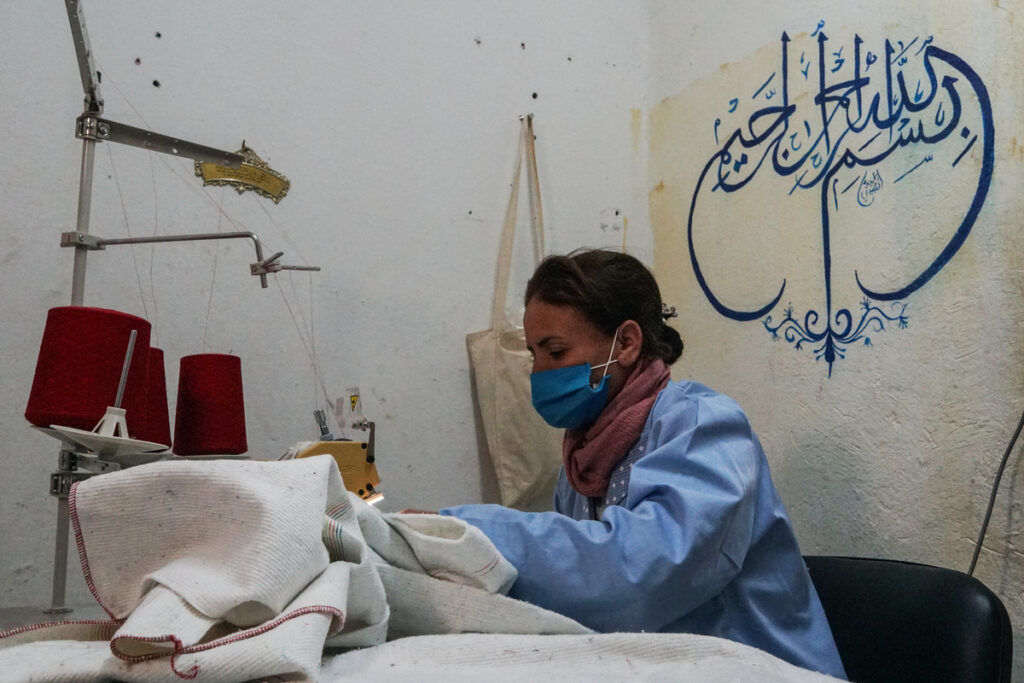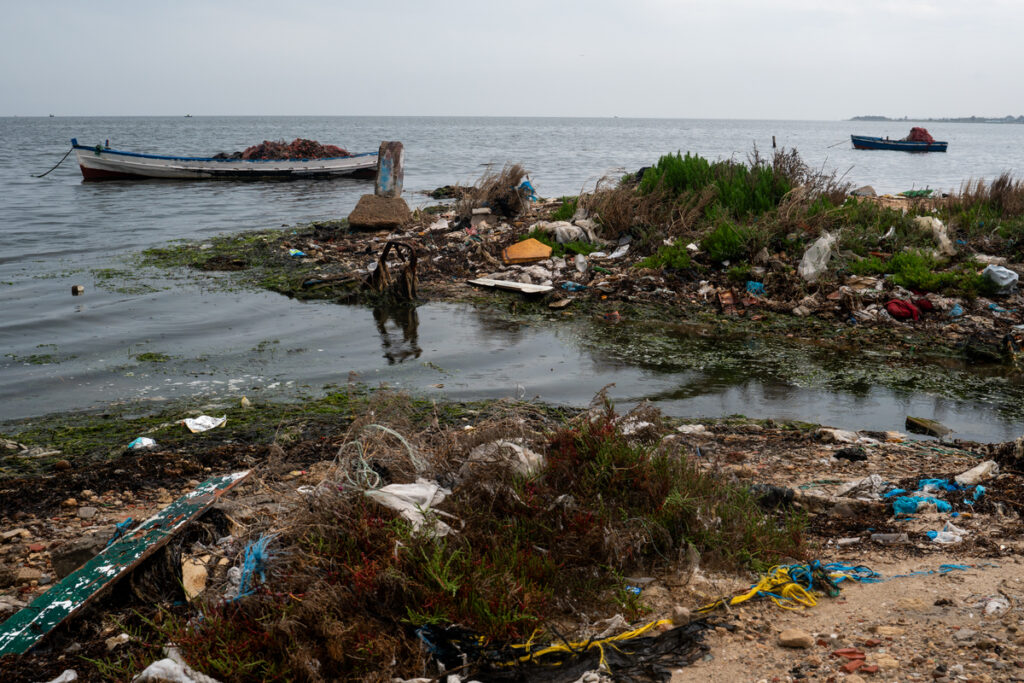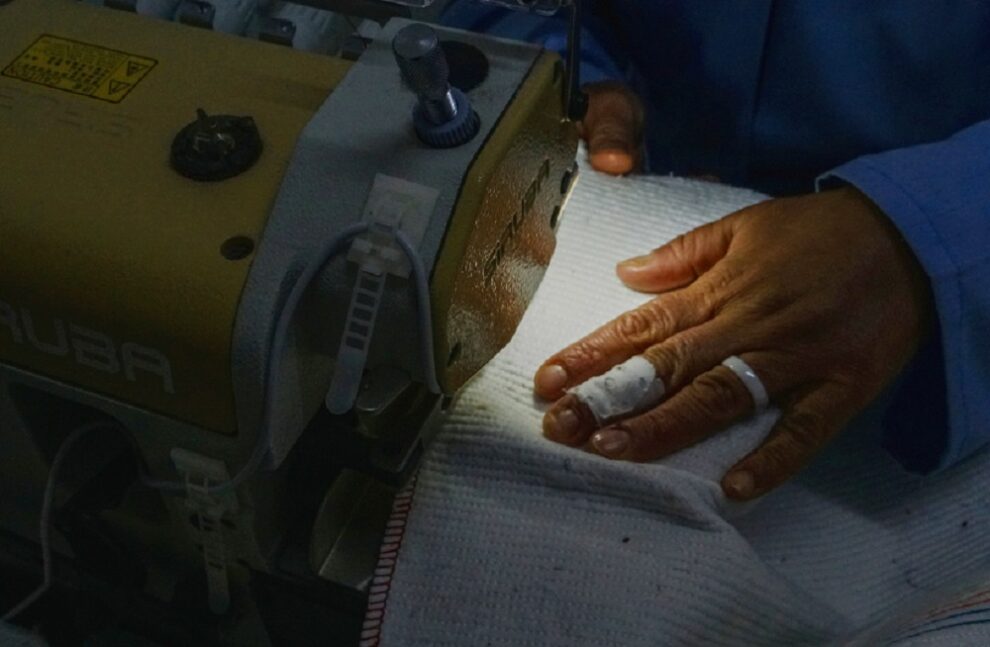Tunisia is the ninth largest exporter of clothing to the EU, with 82% of its production going abroad. Armani, Moncler, Lacoste: many famous brands have set up there, attracted by its cheap labour. For workers and the environment, there is a price to pay.
The production line at the Tunicotex factory is a long one in this five-hectare hangar on the outskirts of the town of Slimane (Tunisia), on the other side of the mountain that forms the skyline from the windows of Tunis. The hands of thousands of textile workers – most of them women – measure, sew and wrap.
The spools of coloured thread are first transformed into sections of fabric, then into jumpers for the autumn-winter collection. These are then embellished with the logos of major brands: Armani, Moncler, Lacoste, Calvin Klein, and so on.
The final stage is to apply the label. Sitting at a counter, the door open to let in the last of the evening sun, two women apply the barcode, repeating the same mechanical gesture. Every weekend, lorries transport the clothes from the huge warehouse to the port of Radès in Tunis. From there they are shipped to the major European ports, and then on to shops in France, Italy, Germany and Spain. The meagre salary of the workers: a little under 600 dinars a month, around €179.
“In Europe, nobody wants to do this work any more. And if Tunisia became a rich country, we might not find a workforce here either”, says Haithem Bouagila, president of the Tunisian Textile and Clothing Federation (FTTH), a trade association representing employers. He is also director of the Tunicotex factory. Like most others in the sector, it enjoys offshore status.
Sitting in his office, surrounded by the season’s new creations, Haithem Bouagila lists the advantages of the Tunisian market: “close to Europe”, “inexpensive in terms of transport”, “with a long tradition in the field”. But at what price?
The outsourcing of the fast-fashion industry immediately brings to mind Bangladesh or China. But the Mediterranean region is also concerned. “Foreign entrepreneurs choose Tunisia for its cheap labour, to the detriment of social and environmental rights”, comments Mounir Hocine, president of the Tunisian Forum for Economic and Social Rights (FTDES), an association based in the Monastir region in the north-east of the country.
Tunisia is the ninth largest exporter of clothing to the EU, after Cambodia, according to a study carried out by the Centre Technique du Textile in 2022. More than 1,530 companies are implanted there, representing 31% of the country’s textile production. 82% of this production goes abroad. The industry is built predominantly on a poorly-paid workforce of women. The queue of female workers seeking legal assistance from the FTDES for abusive situations is getting longer, says Mounir Hocine.

That’s what Meriem did after losing her factory job. At the end of the entrance hall to her small ground-floor flat in the town of Ksibet El-Mediouni, a few kilometres from Monastir, she has set up her sewing machine. With her fingers covered in bandages, this is where she now produces cleaning cloths. They are then distributed to Tunisian department stores by the Les Mains Solidaires cooperative, a project supported by the FTDES, Lawyers Without Borders (ASF) and IWatch. Its aim is to help reintegrate female workers who have been pushed out of their jobs without notice.
The reason for such situations: a drop in productivity, often due to illness, an accident or simply age. “Younger hands are quicker,” says Meriem, who found herself unemployed at the age of 40. “It would take a while for mine to loosen up after fifteen years of work.” Her sister, still wearing a green apron, concurs: “My fingers often turn blue from repetitive movements”.
“Around 65% of these women fall ill because of their work. They suffer mainly from musculoskeletal disorders”, explains Mounir Hocine. He says that the “textile disease” represents a major burden on state spending.
When she found herself out of a job overnight, in the middle of Covid-19, Meriem discovered that she had no rights and no bargaining power. Social-security contributions were not included in her contract. Her factory, a garage on the outskirts of Monastir, was not even registered.
“The sector functions like a Russian doll”, observes Habib Hazemi, president of the UGTT’s General Federation of Textiles, Clothing, Footwear and Leather. Adel Tekaya, president of Utica, the other branch of the employers’ association in Monastir, confirms that “tracing the chain of responsibility is very complicated, if not impossible”.
This is all the more true given that the average age of a textile factory rarely exceeds nine years: after ten years, companies can no longer benefit from the tax advantages guaranteed by Tunisian investment law. “They take steps to relocate again, or reopen under a different name. In this way, no one is responsible for the social and environmental damage they leave behind”, says Mounir Hocine of the FTDES.
Fatima Ben Amor, a prominent figure in civil society in the small town of Ksibet El-Mediouni, knows this very well. This young activist, who grew up after the 2011 revolution, is working with the Association for the Protection of the Ksibet Environment (Apek) to clean up the bay to the south of Monastir. For years, local factories have been using the bay as a dumping ground for their pollution, which includes chemicals such as dyes, acetic acid, detergents and hydrogen peroxide.

At issue: the washing and dyeing of jeans. This source of “Tunisian pride”, as some local entrepreneurs call it, is a finishing process involving a lot of chemicals and massive water consumption: between 55 and 72 litres per pair of jeans, according to the FDTES.
In 2022, 11 million pairs of jeans were exported to the European Union. 85% of them had undergone this treatment.
The president of FTTH assures us that “the large companies in the region have all the necessary certifications and a closed cycle that allows the water to be reused”. But the sea opposite the town of Ksibet is decidedly murky. A few boats are swaying on a blanket of green algae. “Thirty years ago, this was a nursery for many Mediterranean fish species. Today, there’s nothing left”, comments a worker at the port of Ksibet El-Mediouni, speaking on condition of anonymity.
A number of fishermen in the region confirmed that a lot of fish had disappeared. People are also affected: the local community believes that carcinogenic diseases are on the increase, but a cancer register has never been set up. The young activist’s conclusion: “Whether it’s humans, vegetation or wildlife, nothing lives here any more. For whose benefit?”
Source : Voxeurop




























